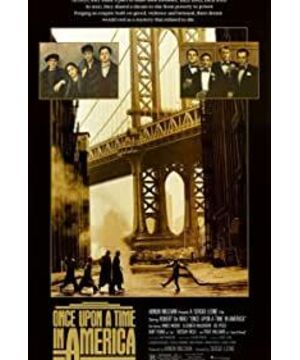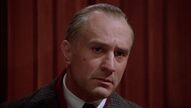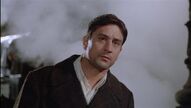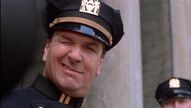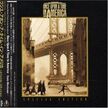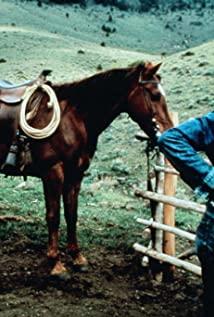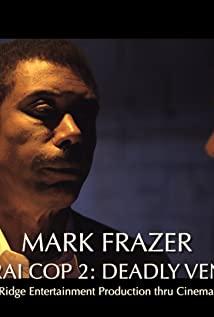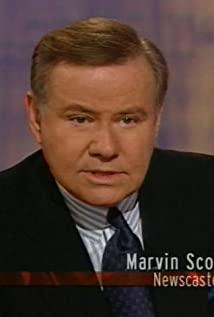Excluding plot factors first, any movie in the "Once upon a Time in America" and "The Godfather" trilogy is more than two and a half hours long, and the theatrical version of Once upon a Time in America reaches three and a half hours. Twenty-eight minutes an hour. Neither film adopts the fast-paced narrative style of the storm: directors back then had more sculptural power than today's directors, using loops and cutscenes with ease and carefully culling holes, rather than Like today, the director uses the visual impact of bizarre transitions and special effects to make the audience ignore the loopholes. But this finely crafted look today may sometimes be just a pretentious hypocrisy. How an old movie can avoid the contrast of viewing experience in different eras caused by the progress of this era may not be what the director thought at that time. But "Once Upon a Time in America" undoubtedly has the upper hand in this regard. On the premise that the scene layout is not inferior to that of "The Godfather", "Once Upon a Time in America" has the wonderful soundtrack, the complex narrative structure, the skillful and changeable use of camera language and even the cast. The choices are well thought out and far beyond The Godfather's level.
Back to the plot. It is actually difficult for me to understand why an audience with a traditional Chinese cultural background can give "The Godfather" such a high evaluation. On the plot of power, on the survival strategy, on the viciousness of the throwing of morality and the means, China has "Romance of the Three Kingdoms" as early as the Ming Dynasty, why bother to leave the near and far and seek "The ends justify the means" from Hollywood movies. This has been aged for thousands of years. Roush son? "The Godfather" is a very pure gangster movie. It fails to inject too much warmth and reflection into the survival story of Sicilian descendants, but regards too much warmth and stagnation as things that interfere with men's reason - I think Viewers will remember the end scene of The Godfather Part 1, where a closing door separates the powerful Michael from his wife. But Michael's mental journey from escaping the underworld to taking over his father's mantle in "The Godfather" lacks a transitional process in both the original novel and the movie, and his wife hardly plays a role in this transition. The role of tripping Michael was subordinate from beginning to end. Therefore, the idea of "The Godfather" is also extremely unfortunate. Hardly popular with women. Similar themes and ideas have rarely become the focus of attention in European and American cultures for hundreds of years, which is probably an important reason for the popularity of "The Godfather". It is a deconstruction of the over-promotion of humanistic care, a reflection on the mainstream Western values, and a voyeuristic behavior that peels off the warm skin of human nature and aims to survive the dark side. Literary critics often say that domestic films lack humanistic care. If domestic films go the way of "The Godfather", I am afraid that they will really lack humanistic care.
Humanistic care is also not the touchstone for testing the transcendence of a film and television work. A nifty tendency is to make humanistic care a tool to win the audience's tears rather than an index for the audience to think: The hero who lives in vain, keeps going forward, is broken at the end, but dramatic crying, kneeling, and silence, Then close up those pretending to be deep eyes, and the montage of the past bombards the audience in turn, and the director can say with a sigh of relief: I have finished my homework, you can't say that I have no humanistic care... These tears come too Too cheap. The ruthless character was still smoky in the past. Who would have thought that he would look like an amorous prodigal son in an instant, but it only means that the film has too much preaching atmosphere - Heshen in "Dream of the Forbidden City" is an example of this.
"Once Upon a Time in America" is on the contrary. Its focus is on humanistic care. The pleasures and hatreds and sweet stories on the underworld are just embellishments, and these embellishments are not artificial or superfluous at all. Youdouyouyan and the protagonist Noodles are very affectionate and sexual, which is a polar contrast with Max's unscrupulous efforts to achieve his goals. I don't think they can form two poles, but they started to part ways at a certain point of mutual growth, just like starting the game with the same initial occupation in an online game, but in the middle of it, they went to two different development directions. The difference between them is that Noodles has always adhered to the bottom line of love and responsibility, while Max has gradually given up this bottom line. When Noodles first met Max, the ambition and means of the two were equal, and Noodles may be better, as can be seen from the details of stealing Max's pocket watch and designing the smuggled goods to sink underwater and escape tracking. Noodles' lag behind Max has something to do with the plot that he ended up in jail for killing a policeman in revenge for Dominic, as well as his love for Deborah. Only because he spent more than 4,000 days in prison as a teenager, his longing for Deborah and his remorse for Dominic's death became irresistible. The only thing he could think about day and night in his helplessness, these feelings were in prison. Under the high pressure, he became his spiritual pillar, and finally completed the shaping of his general personality. And Noodles' subsequent experience has undoubtedly brought some fatalistic tragedies.
In the same way, these 4,000 days and nights were a very important growth stage for Daborah and Max. As far as Max is concerned, the small gang's original dual-core structure with Noodles-Max was broken by Noodles' imprisonment, and he became the absolute core in the true sense, with sufficient space to decide the development direction of the small gang according to his own will. There is a more utilitarian element in his character, so he has become a cruel and ruthless character in the constant underworld polishing. As far as Daborah is concerned, the last time she saw Noodles before he went to jail ended with Noodles leaving in a hurry and being brutally beaten by a bully on Daborah's doorstep. Daborah, like Max, has ample time and space to choose her attitude towards Noodles. She is an aspiring girl who kisses Noodles when she almost intends to melt her ideal of becoming an actress, but is interrupted by Max's interruption and Noodles' untimely departure. . The proud girl's self-esteem was hurt. And it was almost the only time in my life when I lowered my stance. It can be said that from this moment, Noodles is destined to not get Daborah. He can neither sacrifice his life to support Daborah's ideal, nor can he use a more powerful ideal to attract the relatively humble Daborah like Max.
These more than 4,000 days and nights, for Noodles, are days and nights of indulging in the past and deepening their feelings for the remaining two people, but for the other two, they are firming the pace of reality and moving forward and they are no longer affected by feelings. Days and nights of entanglement with this notion.
After Noodles was released from prison, Max was leading a small gang to run a speakeasy in the former restaurant of Fat Moe, which was attracting the upper echelons of American society with its ample liquor reserves and high-class prostitutes during Prohibition. Daborah is also working hard for his stage career. They no longer stop for Noodles, but because of the lack of growth in the twelve years from 1921 to 1933, Noodles will be immersed in memories of 1921 and before. among.
Judging from his recollections, there are reasons for his lifelong addiction. From his birth to 1921, it was probably the era when the US government had not promulgated the prohibition of alcohol, and it was also the era when jazz was popular in the world. The women on the street were not wearing clothes. High heels are leather boots, and men will habitually behave like a gentleman when they meet women in public. In this yellowed background of memories, Noodles first glimpsed Daborah, who taught himself ballet in the bakery warehouse, and fell in love with her. It was also in this yellowed background that Noodles unexpectedly met the same bohemian as him. Max, the two began to attract each other. This attraction stemmed from an expectation of shared responsibility, a recognition of each other's abilities, and even trust in each other's personality.
Until Noodles was jailed, Noodles had never been able to keep up with Max in any of the plans in the small gang of six. When he was dragged to the bunker of the carriage and fought bravely against the enemy, Max, who was hiding on the sidelines, revealed an expression of envy and jealousy, but at the same time, Max also gradually realized that it was Noodles who were in the underworld. Continue to climb character barriers. Noodles then went to jail for killing a police officer in revenge on his brother. This ready-made counter-example makes Max all the more determined to go the opposite path of Noodles.
12 years later, Noodles still maintains its seat in the small gang after being released from prison, but obviously can no longer form a "dual-core" member with Max. At the same time, Noodles thinks differently when the small gang collectively plans a certain action. There are more and more cases of going to Max. Sometimes Max just explained it to him afterwards for convenience. In an operation to rob a diamond dealer indirectly commissioned by a Detroit underworld gangster, the small gang killed the employer and monopolized the diamonds and commissions without Noodles' knowledge. This betrayal aroused Noodles' vigilance , he worries that the betrayal will grow and eventually affect the friendship of the gang.
Noodles began to act like an outsider, enjoying the fortunes of the gang, deciding how much he wanted to invest, letting go of the underworld when he missed Daborah, and smiling. It's just that Daborah has had a hard time focusing on Noodles. In her opinion, Noodles is not only still a gangster like when she was a child, but now she's still a gangster who eats the basics of her friends. Even by the standards of gangsters, they all have negative strikes. behavior. How can such a person deserve to be entrusted to Daborah, who dreams of entering Hollywood, she and Noodles attended a luxurious dinner and later rejected Noodles' marriage proposal. Disappointed Noodles raped Daborah on the taxi, felt that Daborah was reluctant and caused the driver to brake and then carefully closed his hand. , although Noodles is a lucky dick who does nothing. Daborah left Noodles to go to Hollywood. The sad Noodles once again put aside the affairs of the gang and indulged himself in the sensuality, consuming his original talent bit by bit.
Noodles is constantly showing the process of emphasizing love over profit, and it is also the process of his partner Max's constant disappointment in him. Of course, even if there is no such disappointment, Max's future betrayal plans to other members of the small gang will not be affected in the slightest, because other members of the small group are not as unbearable as Noodles, and Max, whose selfish desires and ambitions are constantly expanding, has become no longer caring about friends. If you take into account the feelings of , it is only for the purpose of use. A tight-knit betrayal plan gradually took shape in Max's mind.
This betrayal plan includes two parts, one is to cross the river and demolish the bridge, and the other is to escape from the shell. The so-called demolition of bridges is to abandon the original gangs and turn to political and economic alliances with corrupt police departments and corrupt union leaders. This alliance is facilitated by a politician named Sharki. Sharki was not only a speculative politician but also a man with a brilliant business vision, nearing the end of Prohibition in 1933. A large number of trucks for smuggling alcohol products are about to be resold to enter the normal transportation channel. This behavior is supported by the guild, and the union leader has been rescued by a small gang (the reason for the rescue is not given a clear explanation in the video , It seems to be the behavior of the small gang of chivalrous heroes. Without referring to the original work of the novel, I speculate that Sharki deliberately pulled the strings to promote the alliance in the future, and all the members of the small gang, including Mak, did not know about it at this time). This alliance would create a stronger political-business-underworld interest community, and when Sharki told the gang and Noodles about this plan, Noodles scoffed because he hated politicians and the other two members of the gang had a different attitude. negative. Max has to get rid of the group's opponents of alliances, or once Prohibition is lifted, the group's main business, a speakeasy and high-end leisure club, will lose its value.
Noodles' tough refusal to get involved in politics forces Max to make concessions, while the lingering of friendship that remains in his heart leads him to agree to go on a beach vacation with Noodles. Time waits for no one. While on vacation, the two read a newspaper that published the news that Prohibition had been lifted by the government. Max could no longer tolerate the only trace of friendship, and was determined to completely eliminate those who were unwilling to cooperate. He formed an alliance with Sharki and the union leaders alone.
This is the demolition of bridges across the river.
The second part, Jin Chan's shelling, is very critical to the success of "crossing the river". First, Max once violated the prohibition law and opened a speakeasy. Second, Max's gang, as a gang, has already committed countless murders. If you want to form an alliance with politicians and unions, you must first clean up the filth of the past in the long run. , otherwise it can only play the role of a thug, not to mention for the time being, and there is a danger of being "removed" by politicians. To be whitewashed, then the identity of Max will no longer apply. Similarly, those who are familiar with the identity of Max but do not cooperate must be wiped out in the plan of "crossing the river and demolishing the bridge", and Max himself must die, at least in legal terms. Dead in the sense, and Max's physical body will cooperate with Sharki in a new identity. The job of granting a new identity must naturally be done by Sharki, who is familiar with the officialdom.
The specific steps of the plan are as follows.
First, trick the Noodles. Max told Noodles that he was determined to loot the Federal Reserve Bank of the United States, the US central bank (as a finance student, I would like to remind the author: the first US central bank is actually an association of private banks independent of the US government, and looting does not constitute retaliation ; Second, if robbing banks was not for the purpose of retaliating against the government for lifting Prohibition, then looting commercial banks would not necessarily be less profitable and much less difficult than looting the Federal Reserve). This way Noodles will feel that Max is insane or courting death.
The second step is to let the mistress Carol go on the offensive and tell Noodles that she doesn't want Max to risk his life because of this. One way to save Max is to report him smuggling beer before he implements the plan to loot the Fed, and let him go to jail first. But being imprisoned instead of being shot by the bank's armed police can be regarded as "saving" Max. Calling Carol to do this shows that Max knows that for Noodles, enticing has no effect, and seduction has no effect, but the most effective thing is sexual enticement and righteous enticement.
In the third step, after the police received a report and came to raid the base camp of the small gang, together with the police (it was mentioned earlier that the police had already been in sympathy with Sharki and the small gang), they used a skeleton to forge the burned body of Max, and the police killed him at the same time. Others in the dead gang complete the erasure of the uncooperative and the insider.
In the fourth step, Sharki and the police created a brand-new identity for Max. From then on, Max entered the political world and enjoyed endless glory and wealth, and the alliance was officially formed.
In this plan, there is a detail in the film that is actually very vague, that is, whether Noodles, who was "seduced" by a whistleblower, will die. At the beginning of the film, the police broke into the Chinese theater to find Noodles, and Noodles escaped with the help of the theater informant; and the police beat Fat Moe to ask where Noodles was at one time; near the end, Noodles was told by Max that it was intentional Let Noodles go to let him go.
If, as Max said, he was going to let the Noodles go on purpose, then --
the fifth step, let go of the Noodles on purpose. Noodles knew they were being hunted by the police and would flee abroad. At that time, when he knew that all the members of the small gang were shot dead by the police, he would have felt that his report caused the death of Max and others, and he did not save Max. So the success of Max's righteous seduction was also accompanied by his lifelong "righteous abuse" of Noodles, which made Noodles, who attached great importance to love and righteousness, live in remorse for the whistleblower.
This plan (if the fifth step is admitted) is extremely selfish and cruel.
It also implemented very smoothly (if the fifth step is admitted). Aware of the police pursuit, Noodles boarded the first train after arriving at the train station and fled to Coro Island.
...
In 1968, 35 years after Prohibition was lifted, and at the beginning of the film sequence (excluding the flashback at the beginning), Noodles, who was living alone on Coro Island, received a mysterious invitation. The content is that a political powerhouse named Bailey is inviting the Noodles to a dinner party in New York. After Noodles came to the United States, he learned from the TV news that Bailey was deeply involved in a political scandal at the moment and was suspected of being associated with union leaders. He also learned that Bailey had done something that shocked and saddened him. That's making Noodles' beloved, Daborah, who has become a Hollywood celebrity, his mistress.
There was no doubt that Bailey was Max, who had been "legally dead" thirty-five years ago, and poor Noodles had no idea. In order to find out the truth, he came to the residence of his sweetheart Daborah. The love between the two came to their hearts in the past, but they couldn't choose to get back together, because Daborah was already the mistress of a politician, and her "move to the top" was realized with the help of Max. Noodles is full of hair, and Daborah is struggling to maintain her beautiful appearance with a table full of high-end cosmetics. Daborah attempts to hide Bailey's true identity from Noodles and warns Noodles not to attend the dinner. At this moment, Max and Daborah's son came knocking on Daborah's door, and Daborah, nervously, warned Noodles to leave through the back door.
Daborah: Keep walking. Don't turn around. Please.
Noodles. I beg. Please. (Afraid of me shedding a lot of tears?)
Daborah: If you go out of that door, yes
. Asking for the truth, he must potentially know that obtaining the answer will be an opportunity to relieve his heart. The confusion lingered in his mind for thirty-five years, and the guilt that kept rising made him deny his past self and deny that he was not good enough. Even if the person he loves the most in the world obstructs his pursuit of answers, how could he give up because of this?
He ignored his sweetheart's warning, opened the front door of the room with an old hand, and saw David, who was exactly like the young Max. And David is Noodles' real surname.
He knows the truth, but he still has to ask the reason for the truth. He attended the dinner party and met Max.
The reason is that Max created the imaginary of his own death. He earned 35 years of prosperity and wealth, but left several partners with the end of their lives and left Noodles with 35 years of painful memories.
A twelve-year prison life had allowed Noodles to immerse himself in the memories of the past and be shaped by memories, and now these thirty-five years can be said to have completely destroyed Noodles' life. The heroic spirit of the young man has been exhausted by the years, leaving behind a body of remorse and self-blame.
Now Max is mired in political scandals, he can't play, the investigative committee is pressing him step by step, and he knows his time is running out.
He wants Noodles to come all the way to end himself and make himself responsible for Noodles' failed life, so as to complete spiritual redemption.
Of course Noodles refused.
Max: Is this the way of your revenge? (Is this your way of getting revenge on me?)
Noodles: No. (No...)
Noodles left Max alone and left again, Max jumped into the garbage truck outside the back door of the manor and committed suicide.
Noodles, who was alone again, watched the taillights of the garbage truck fade away, and the memory came back to his mind, and the taillights turned into white headlights. A virtual scene appeared. It was 1933, when Prohibition was just lifted, people swarming the streets cheering, and in the background, 26-year-old Noodles had just tipped off the police and was smoking opium at the Chinese Theater. At this point Noodles didn't know about Max's "death". His mood became very complicated because of his betrayal, so he took a few mouthfuls of opium too hard. In the wonderful hallucination caused by opium, he thought that after all, he had saved his best friend Max's life through a whistleblower. No matter what, he smiled happily.
The video ends here.
Thirty-five years later, Noodles must also smile with relief and relief. He doesn't have to regret his lack of thoughtfulness and meticulousness. He is still the same Noodles who values love and righteousness. And these thirty-five years of remorse began after that brief gratifying smile thirty-five years ago - Noodles didn't know about the police raid on the small gang's base camp, and he came to the Chinese Theater probably because he smoked too much opium. Some abnormal symptoms (coma?) occurred due to excessive agitation. The old man at the theater brought a bowl of ginger soup or something, and gave Noodles a drink to ease his symptoms. After sobering up, Noodles found a newspaper on the left side of his body and picked it up to read. It said the death of the other three of the gang. Thirty-five years of exile began.
This is where the film begins.
View more about Once Upon a Time in America reviews


